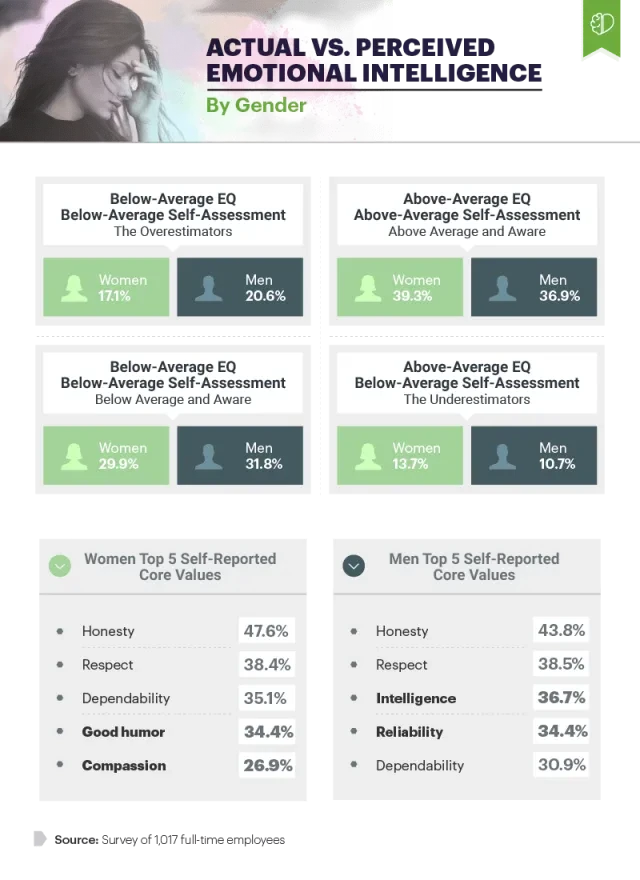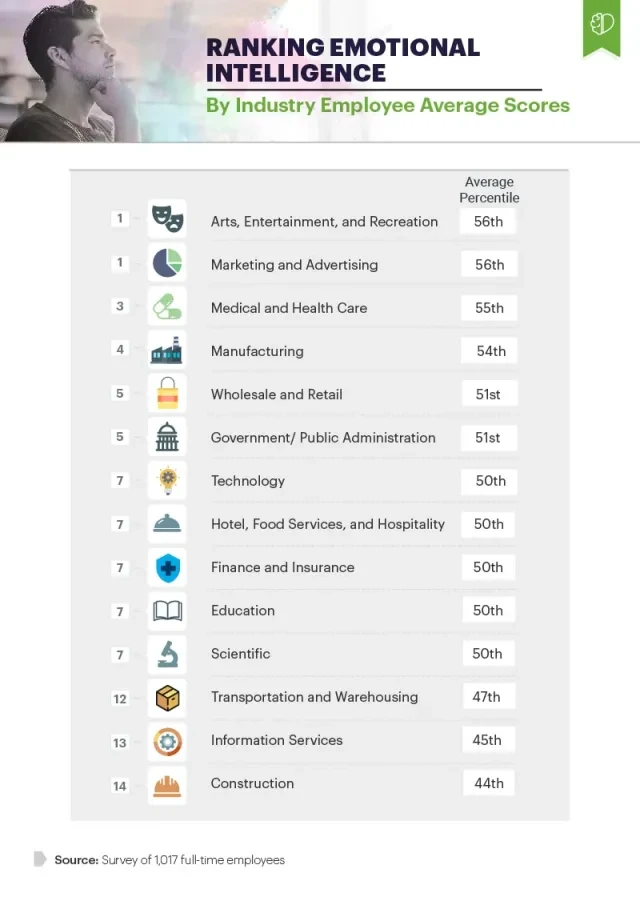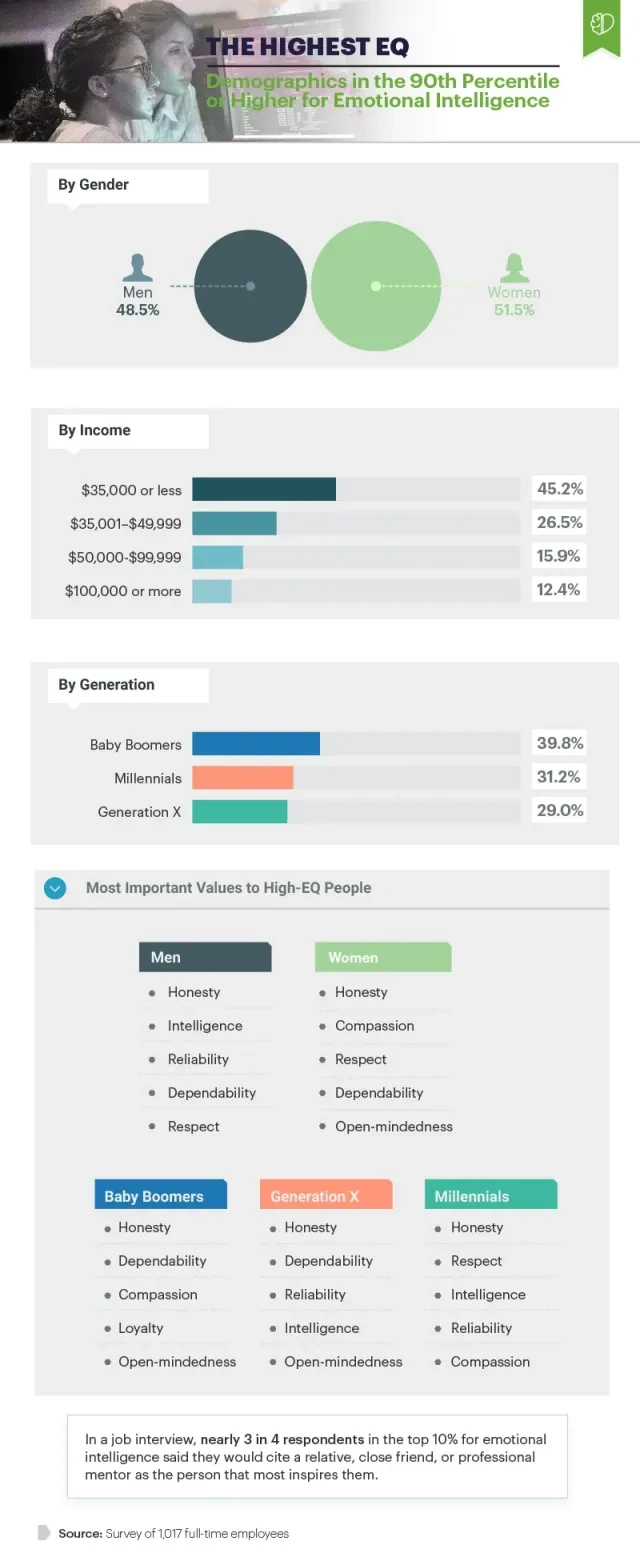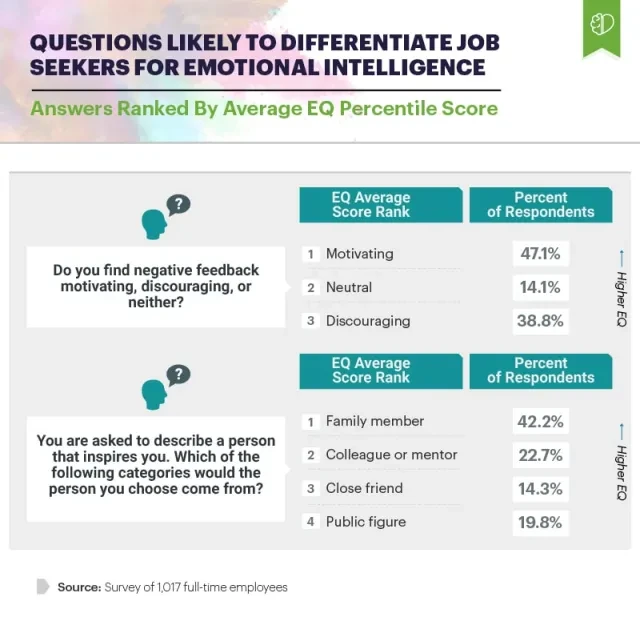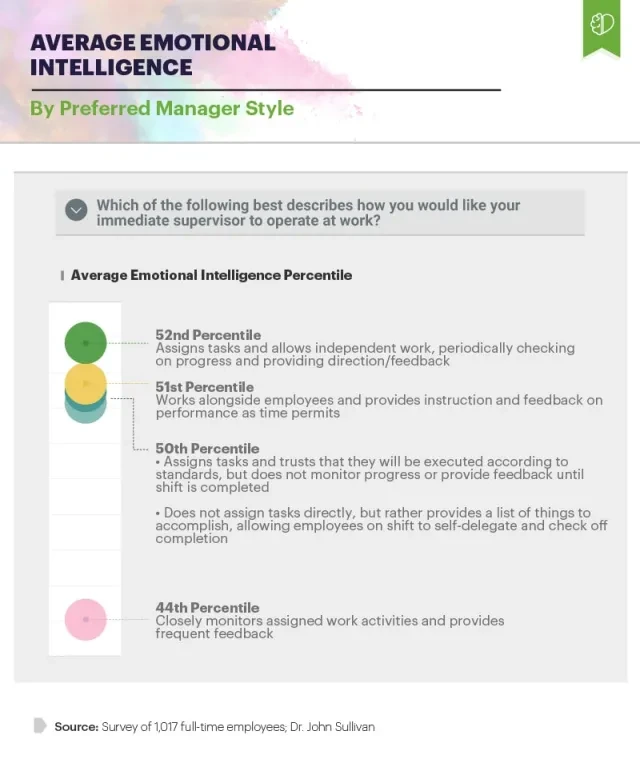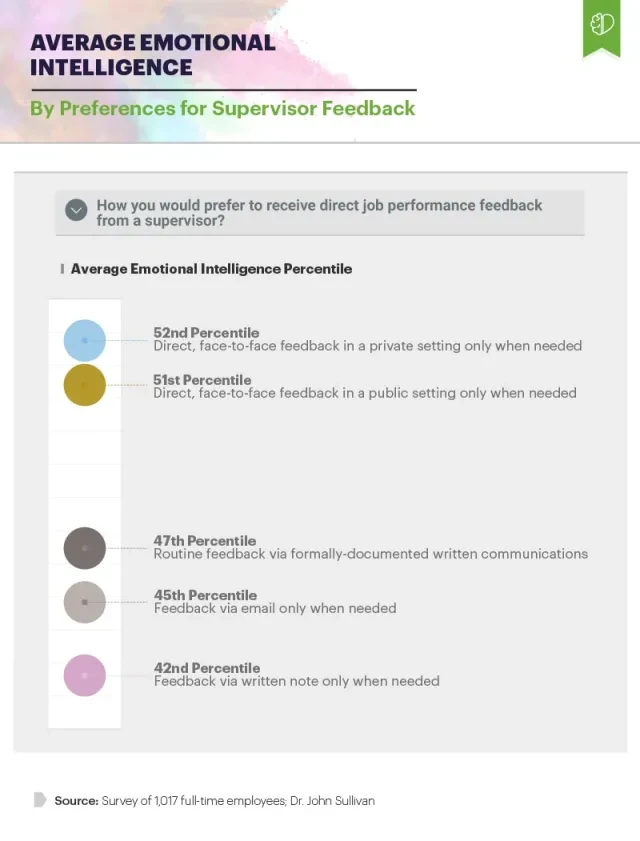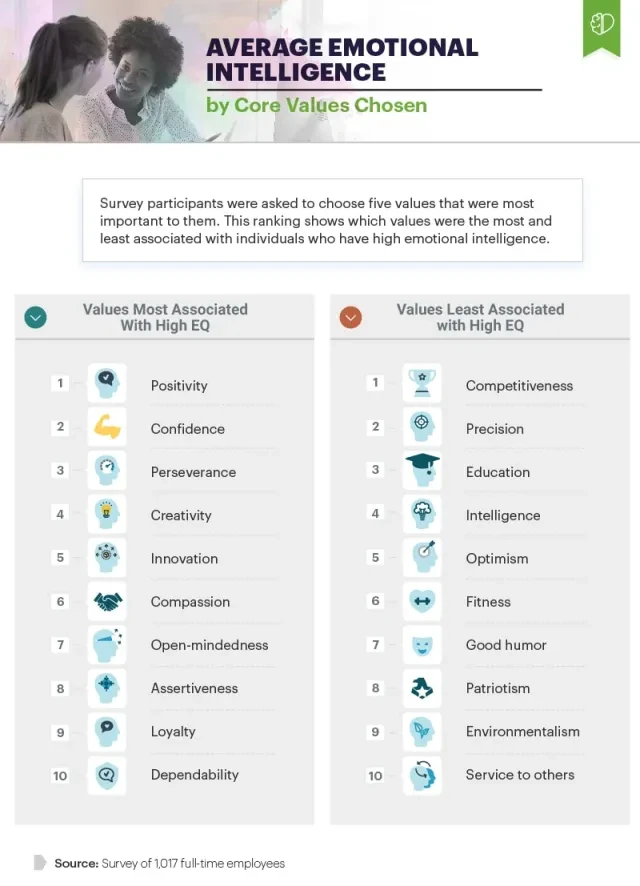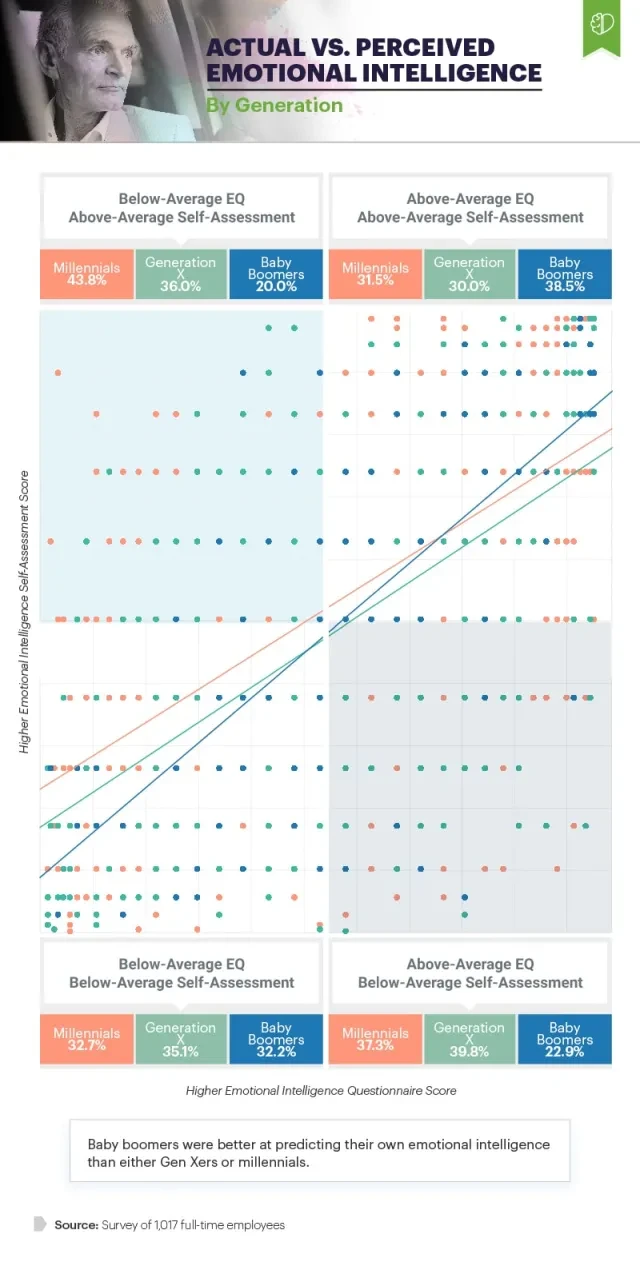- Human Resources
- Article
- 6 min. Read
- Last Updated: 01/14/2019
Emotional Intelligence in the Workplace
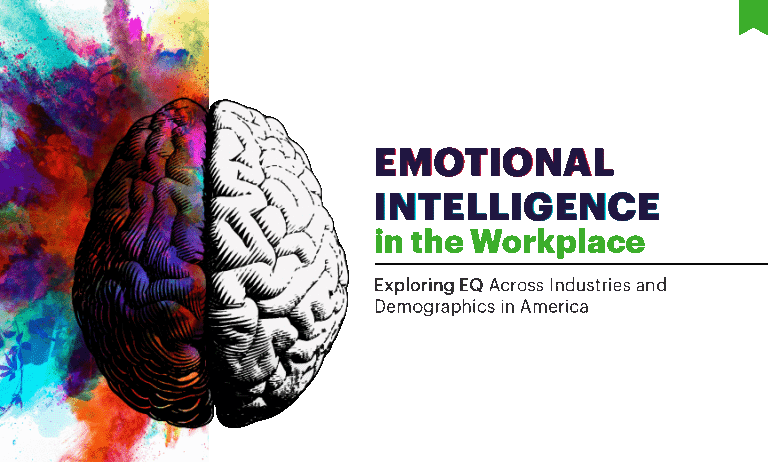
Table of Contents
Personable. Team player. Trustworthy. Responsible. These terms may be tired staples of the resume genre, but they also speak to what many successful workers share: a capacity to recognize and regulate their own feelings and respond appropriately to the emotions of others. Defined broadly as emotional intelligence (EQ), this internal and interpersonal skill set has attracted the attention of business leaders across the globe. In fact, the World Economic Forum predicts that emotional intelligence will rank among the attributes employers covet most by 2020. But how many professionals possess an admirable degree of emotional awareness, and how might businesses find them?
We set out to explore what emotionally intelligent workers have in common and whether most people overestimate their own aptitudes in this area. To do so, we administered a questionnaire designed to gauge emotional intelligence to 1,017 professionals. Analyzing their results for demographic and psychographic similarities, we’ve discovered which traits correlate closely with high measures of emotional intelligence. Whether you’re a hiring manager searching for emotionally mature workers or looking to expand your own self-awareness, you won’t want to miss what we found.
Sensitivity or self-delusion?
Accurately assessing one’s own emotional intelligence might prove challenging — in fact, it might even require some degree of emotional intelligence to do so. When we compared our emotional intelligence assessment results to what respondents said about themselves, a significant portion of men and women overstated their skills. Roughly 17 percent of women and one-fifth of men had below-average EQ scores but above-average self-assessment results. The majority of respondents were more accurate, however, with most men and women correctly assessing whether their emotional intelligence was above or below average.
When we assessed which virtues of EQ were most important to each gender, honesty and respect mattered most to men and women alike. Beyond those characteristics, however, interesting disparities emerged: Intelligence ranked third for men, whereas women particularly prized dependability. Female respondents also valued good humor and compassion to a greater extent than their male counterparts. These findings resonate with recent research indicating that female business leaders are perceived as more compassionate than their male counterparts, and that women appreciate compassion in political leaders to a greater extent than men. The degree to which these findings are shaped by our culture’s prevailing gender norms remains an open — and fascinating — question.
Emotional aptitude, by industry
Which fields seem to attract a disproportionate number of emotionally intelligent people? Our data suggest those who work in the arts and entertainment fields possess the greatest emotional intelligence on average, followed by marketing and advertising professionals. In these audience-oriented industries, the benefits of understanding and responding to the emotions of others are obvious. Medical and health care professionals possessed exceptional EQ levels as well, an encouraging sign in a field concerned with the state of doctor-patient relations. Responding to a decline in patient engagement, medical schools have begun training aspiring physicians in empathy and effective communication — both core EQ values.
At the other end of the spectrum, construction as well as information services and data processing were the industries in which emotional intelligence seemed most scarce. That’s not to say that EQ skills aren’t advantageous when practiced in these fields: Empirical studies show that project managers with higher levels of emotional intelligence are more effective in supervising construction jobs. Indeed, our research suggests that an increased emphasis on emotional intelligence is sorely needed in some industries. The field of education offers a prime example. While experts recommend that educators impart EQ to their students, our findings suggest many teachers may lack EQ skills themselves.
Exceptional EQ: common characteristics
Which demographic characteristics define the most emotionally intelligent cohort in our study? Among those whose EQ scores placed them in the 90th percentile or higher, men and women were represented fairly evenly. Interestingly, however, emotional intelligence seemed inversely correlated with income to some extent. About 45 percent of high-EQ individuals earned $35,000 or less annually. This data is particularly interesting because prior studies have suggested that emotional intelligence positions workers for career advancements — which typically entails increased compensation. One explanation might lie in career selections. Perhaps emotionally intelligent people are drawn to fields that are rewarding but not particularly lucrative.
Clear differences emerged between the generations, as well, as baby boomers represented the largest portion of people with top EQ. This finding is likely a function of age: Researchers note that emotional intelligence blooms throughout our adult lives, peaking at about age 60. In terms of the values they held most dear, however, high-EQ baby boomers differentiated themselves from their younger peers, valuing loyalty to a greater extent. The premium this generation places on loyalty has significant workplace implications. Whereas baby boomers often feel connected to their companies, younger folks are more likely to explore new opportunities.
Identifying high EQ: interview queries
Emotionally intelligent people vary tremendously. Our data indicate that answers to certain questions correlates strongly with high EQ scores. One refers to identifying role models: When asked to describe a person who they admired, high-EQ individuals were typically drawn to describing someone they knew personally, rather than a public figure. Higher-EQ respondents were also particularly likely to prefer a motivating style of constructive criticism, as opposed to feedback couched in neutral or discouraging terms.
Emotionally intelligent people tended to prefer supervision that entailed clear instructions but plenty of employee autonomy. Their instincts may reflect an understanding of what most employees need to function well at work. Researchers find that self-directed workers are consistently happier than those who feel micromanaged and that staffers’ efficiency and engagement increases as they attain more independence.
Emotionally intelligent people preferred direct, face-to-face communication as opposed to written forms of feedback. Their preference confirms what business researchers know well: Although digital tools like email and chat are indispensable to the modern workplace, face-to-face communication is vastly more effective in conveying important information. Additionally, in-person conversations may afford high-EQ workers a chance to practice their powers of perception, interpreting tone and nonverbal cues to assess their colleagues’ emotions.
Principles and priorities
When we asked respondents which values they found most important, certain principles correlated strongly with high EQ scores. Interestingly, positivity emerged as the value most closely aligned with emotional intelligence. This value could be interpreted as either a product of emotional intelligence or a key component in its development. Confidence earned the second spot in our ranking of values correlated with emotional intelligence. Researchers of emotional intelligence are quick to contrast this quality with arrogance. Those with truly exceptional EQ understand their abilities in realistic terms, not inflated ones.
In a surprising finding, certain altruistic virtues were among the least correlated with emotional intelligence. Indeed, service to others, environmentalism, and patriotism were the values least associated with high EQ scores. Perhaps this finding reflects the broad social scope of these values, whereas many high-EQ individuals conceive of good deeds in interpersonal terms instead. For example, compassion and service to others are highly related concepts, but emotionally intelligent people were far more likely to value the former.
Age and accuracy
As noted earlier, a high number of baby boomers have exceptional emotional intelligence skills — and they seem to know it. Among those who rated their emotional intelligence above average and received high EQ scores to justify that claim, almost 39 percent were baby boomers. Conversely, baby boomers represented just 1 in 5 people who rated their skills highly but actually received below-average scores. In this group, millennials were disproportionately represented instead at nearly 44 percent.
Compared to their older and younger counterparts, Gen Xers often assessed themselves most harshly in terms of emotional intelligence. In many cases, this critical assessment proved accurate: Gen Xers represented 35 percent of individuals with below-average EQ results and below-average self-assessments. But they were also the most likely to assess their emotional intelligence as below average when their real EQ scores indicated otherwise. The emotional intelligence of this generation could have widespread ramifications in the years to come, as Gen Xers assume executive positions vacated by retiring baby boomers. Will middle-aged professionals practice emotional awareness in their new positions of power or decide it’s too late to change?
Self-awareness, by industry
No industry was entirely spared from self-delusion: Virtually every field had several respondents who vastly overestimated their skills relative to their actual EQ scores. In information services, for example, some of the least emotionally intelligent individuals rated themselves quite high, whereas many high-EQ workers had relatively humble opinions of themselves. Likewise, several education professionals regarded themselves as roughly average in this regard, whereas their actual scores placed them closer to the 10th percentile. This unsettling pattern was evident to a lesser extent in the construction and hospitality industries as well.
Conversely, some fields were defined by clusters of people who rated their own emotional intelligence highly and earned EQ scores to confirm their claim. In the finance and insurance industries, for example, several professionals ranked in the 80th percentile or higher for self-assessed and actual emotional intelligence. Medical and health care workers displayed a similar pattern, with many workers accurately describing themselves as emotionally intelligent. Whichever field you work in, you needn’t wonder if your opinion of yourself differs wildly from reality. Several reputable organizations offer free online tools to help you gauge your own skills in this area.
Holistic hiring
Our data indicate that levels of emotional intelligence vary greatly, and individuals are often mistaken about how much they possess themselves. For those who fear they lag behind others in this regard, improvement is possible. Business leaders and psychologists agree that emotional awareness can be acquired through steady practice and rigorous self-examination. That journey is unlikely to be easy, but it can pay great dividends — for both professionals and the businesses that employ them.
From building a team to growing a base of customers, the ability to understand other people is indispensable. At Paychex, we not only provide hiring solutions to help you bring on top talent, but we also offer employee trainings and development opportunities around emotional intelligence.
Methodology
This survey looked at emotional intelligence, a commonly used metric in hiring decisions. To assess emotional intelligence, we used the Wong and Law Emotional Intelligence Scale. Participant responses were scaled using a normal cumulative distribution function and are reported here as percentile ranks. For self-assessment, we had participants rank themselves on the five components of emotional intelligence and scored this with the same cumulative distribution function. Thus, the self-versus-actual metrics reported in this project reflect comparisons of these two percentile ranks. We also made use of questions developed by Dr. John Sullivan in order to gauge how respondents would likely reply to typical interview questions.
All responses were collected via SurveyMonkey using a Human Intelligence Test hosted on Amazon’s Mechanical Turk. Our analysis sample contained 569 men, 445 women, and two non-binary participants, with an overall mean age of 36. When appropriate, weighting was applied to account for certain sampling errors in the data and to approximate having drawn an “even” number of a given dependent measure/demographic group. When directly comparing men and women, female data were given a weight of 1.278. In comparing generations, baby boomers were weighted at 7.9625 and members of Generation X at 2.251. A similar procedure was applied when comparing the behaviors of income groups.
Sources
- Why You Should Hire Emotionally Intelligent Employees, Inc., 2018.
- The 10 skills you need to thrive in the Fourth Industrial Revolution, World Economic Forum, 2016.
- Views on Leadership Traits and Competencies and How They Intersect with Gender, Pew Research Center, 2018.
- Women More Likely Than Men to See Civility, Compassion as Essential Qualities for Political Leaders, Pew Research Center, 2018.
- Doctors Use Virtual Humans To Teach Medical Students Empathy, United Press International, Inc., 2017.
- PM Journal
- Emotional Intelligence: Why It Matters and How To Teach It, The Guardian, 2017.
- Why the Emotionally Intelligent May Earn More Money, Psychology Today, 2017.
- This Is the Age When Your EQ Peaks According to Science, Inc., 2018.
- Different Motivations for Different Generations of Workers: Boomers, Gen-X, Millennials, and Gen-Z, Inc., 2017.
- Research Says This Is the Secret to Being Happy at Work, NBC News, 2017.
- Email Is Great But Face-to-Face Meetings Are 34 Times More Successful, Entrepreneur, 2017.
- How Do You Perceive Your Emotional Intelligence?, Forbes, 2018.
- Generation X — Not Millennials — Is Changing the Nature of Work, CNBC, 2018.
- Emotional Intelligence in the Workplace, Paychex, 2019.
- How (And Why) To Develop Your Emotional Intelligence, Forbes, 2018.
- Building Emotional Intelligence for Better Relationships, Psychology Today, 2018.
Tags

